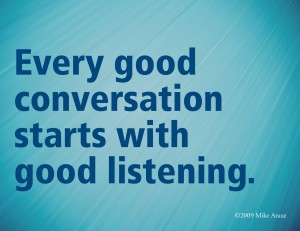 It has been said that, “everything begins with good listening,” and this conversational principle is essential if we are to bring the message of Christ to people in a way that is palatable, making it as attractive as possible so as to bring them to a serious consideration of choosing Christ as their own. We must, ‘seek first to understand, then to be understood,’ if we are to be an effective Christian case-maker.
It has been said that, “everything begins with good listening,” and this conversational principle is essential if we are to bring the message of Christ to people in a way that is palatable, making it as attractive as possible so as to bring them to a serious consideration of choosing Christ as their own. We must, ‘seek first to understand, then to be understood,’ if we are to be an effective Christian case-maker.
Norman Geisler put forth the following ‘formula’ that he has named, conversational evangelism:
“Conversational evangelism consists of four major kinds of conversations we want to have with our nonbelieving friends:
1. Hearing Conversations
2. Illumining Conversations
3. Uncovering Conversations
4. Building Conversations
…Each of these conversational types corresponds to the roles we need to play in our non-Christian friend’s lives: that of a musician, artist, archaeologist, and builder. As a musician, we want to listen more carefully and also we want to hear the sour notes people are singing to us. As an artist, we want to paint a picture using questions to help others see themselves in a true light. As an archaeologist, we want to dig up their history and find the real barriers that are chaining them down. As a builder, we want to build a bridge to the Gospel.”
In focusing on the ‘hearing conversations,’ and placing ourselves in the musician’s role, Dr. Geisler offers the following insight regarding the first step in pre-evangelism, a key component in successful Conversational Evangelism:
“Hearing is such an important step in pre-evangelism for three additional reasons. First, it helps us better connect with others. People feel appreciated when we understand their concerns and show patience in our dialogue with them. Second, it helps to put the other person at ease. If people sense you are genuinely trying to understand them, they may be less defensive and let down their guard to engage in honest dialogue. Third, as we develop good listening habits in our conversations with our non-believing friends, we may be able to identify some inconsistency in their beliefs that will then allow us to ask them just the right kind of question that would lead to further dialogue. This may also help to uncover the nature of their barriers to Christ, whether intellectual, emotional, or spiritual. The Bible reminds us of the importance of listening carefully, for “he who answers before listening—that is his folly and his shame.” (Proverbs 18:13)…our goal is to listen for clues to what our non-Christian friends really believe deep in their hearts.” (To order the book, Conversational Evangelism, here)
In her book, Why Do You Believe That?, Mary Jo Sharp places a strong emphasis on listening to others and the role listening plays in our defense of the gospel:
“Listening to the person right in front of you helps you to discover how to effectively serve that person. People we encounter are at different learning points in their own beliefs. Sometimes, a person has studied about their beliefs. Sometimes, a person barely knows their beliefs. When we assume a stereotype of a person’s beliefs, we might assume something that person either doesn’t know or doesn’t believe. If we ask questions about the individual’s beliefs, and try to understand their beliefs as they do, we can then pinpoint specific issues to discuss.
For example, I engaged in conversation with some folks at my door a few months ago. Instead of telling them what I thought they believed, I asked them, “Who is Jesus?” and “What is Jesus’ purpose?” They had a difficult time with answering these two questions. I realized my background in their religion wasn’t going to be very helpful with these specific folks. So I directed our conversation towards helping them figure out what they believed about Jesus. This was really important to ministering to these individuals. It wouldn’t have well served these two people for me to argue against beliefs they didn’t know or didn’t understand. My conversation with them was more productive because they had to discover and defend their own beliefs.
Listening is also vital in avoidance of creating straw men of other views. A straw man is a weaker version of a person’s argument, and it is an easier version to dismiss or knock down. However, creating a straw man of someone’s argument is not holding your self accountable to the truth. We need to truthfully represent others’ views as part of our witness of Jesus as the Truth. We should delight in the truth, even in the truthful representation of another’s beliefs. But we must listen with the intent to do so.” (Full article/interview here)
I will conclude here with a comment from Greg Pritchard which sums up the overall conceptual approach of Christian apologetics:
“Apologetics is explicitly and fundamentally Christian. Apologetics is a form of Christian love. We are called to love nonbelievers, and a part of how we are to love them is to share the life-changing message of the Gospel with them and explain why this message is true. Part of this love is caring about those who have not heard or understood the Gospel, or who disagree with the Gospel. We need to love them enough to listen to them, ask them questions, answer their questions, challenge them to be genuine seekers of the truth, urge them to examine the claims of Christ…” (Full article here)
First Steps In Christian Apologetics – Mary Jo Sharp








